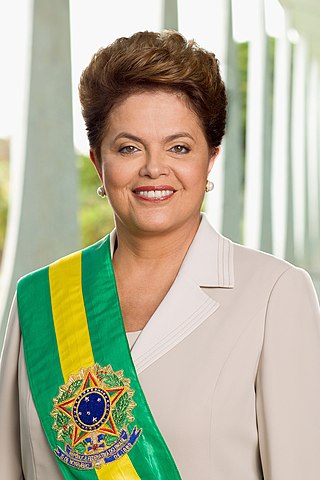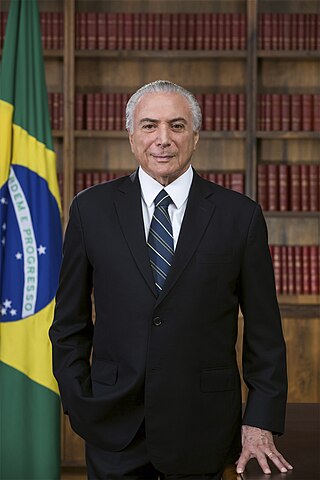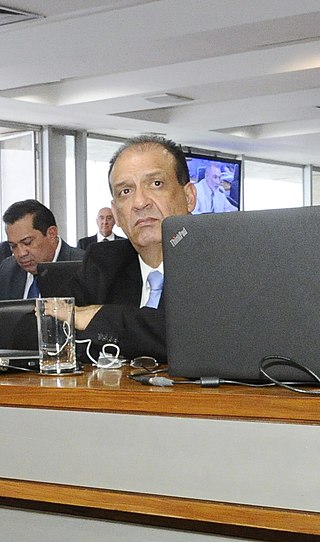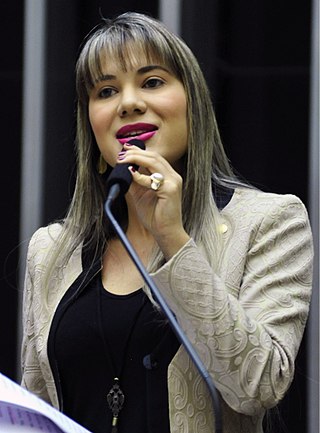
Dilma Vana Rousseff is a Brazilian economist and politician who is the Chair of the New Development Bank since March 2023. Previously, she served as the 36th president of Brazil from 2011 until her impeachment and removal from office on 31 August 2016. She is the first woman to have held the Brazilian presidency. She also previously served as the chief of staff to former and current president Luiz Inácio Lula da Silva from 2005 to 2010.

Michel Miguel Elias Temer Lulia is a Brazilian politician, lawyer and writer who served as the 37th president of Brazil from 31 August 2016 to 31 December 2018. He took office after the impeachment and removal from office of his predecessor Dilma Rousseff. He had been the 24th vice president of Brazil since 2011 and acting president since 12 May 2016, when Rousseff's powers and duties were suspended pending an impeachment trial.

General elections were held in Brazil on 5 October 2014 to elect the president, the National Congress, and state governorships. As no candidate in the presidential election received more than 50% of the vote in the first round on 5 October 2014, a second-round runoff was held on 26 October 2014.

In 2015 and 2016, a series of protests in Brazil denounced corruption and the government of President Dilma Rousseff, triggered by revelations that numerous politicians allegedly accepted bribes connected to contracts at state-owned energy company Petrobras between 2003 and 2010 and connected to the Workers' Party, while Rousseff chaired the company's board of directors. The first protests on 15 March 2015 numbered between one and nearly three million protesters against the scandal and the country's poor economic situation. In response, the government introduced anti-corruption legislation. A second day of major protesting occurred 12 April, with turnout, according to GloboNews, ranging from 696,000 to 1,500,000. On 16 August, protests took place in 200 cities in all 26 states of Brazil. Following allegations that Rousseff's predecessor, Luiz Inácio Lula da Silva, participated in money laundering and a prosecutor ordered his arrest, record numbers of Brazilians protested against the Rousseff government on 13 March 2016, with nearly 7 million citizens demonstrating.

General elections were held in Brazil on 7 October 2018 to elect the president, National Congress and state governors. As no candidate in the presidential election received more than 50% of the vote in the first round, a runoff round was held on 28 October.

The impeachment of Dilma Rousseff, the 36th president of Brazil, began on 2 December 2015 with a petition for her impeachment being accepted by Eduardo Cunha, then president of the Chamber of Deputies, and continued into late 2016. Dilma Rousseff, then more than 12 months into her second four-year term, was charged with criminal administrative misconduct and disregard for the federal budget in violation of article 85, items V and VI, of the Constitution of Brazil and the Fiscal Responsibility Law, Article 36. The petition also accused Rousseff of criminal responsibility for failing to act on the scandal at the Brazilian national petroleum company, Petrobras, on account of allegations uncovered by the Operation Car Wash investigation, and for failing to distance herself from the suspects in that investigation.

From mid-2014 onward, Brazil experienced a severe economic crisis. The country's Gross Domestic Product (GDP) fell by 3.5% in 2015 and 3.3% in 2016, after which a small economic recovery began. That recovery continued until 2020, when the COVID-19 pandemic began to impact the economy again.

The impeachment proposal against Michel Temer, the former President of Brazil and former vice-president, consisted of an open procedural matter with a goal to preventing the continuation of the mandate of Michel Temer as vice president/acting president of the Republic of Brazil. Temer served as Acting President during the Impeachment process against Dilma Rousseff. The process began with the performance of judicial decision on April 6, 2016, the President of the Chamber of Deputies, Eduardo Cunha, to form commission for termination analysis of liability for crime offered by Mariel M. Marra. Four other requests for impeachment were presented to Cunha.

Irajá Silvestre Filho, more commonly known as Irajá, is a Brazilian politician and businessperson. Although born in Goiás, has spent his political career representing Tocantins, having served as state senator since 2019 and previously state deputy from 2011 to 2019.

Marcos Rogério da Silva Brito more commonly known as Marcos Rogério is a federal senator of Brazil representing his home state of Rondônia. He previously served in the chamber of deputies from 2011 to 2019.

Nilton Balbino better known as Nilton Capixaba is a Brazilian politician. Although born in Minas Gerais, he has spent his political career representing Rondônia, having served as state representative from 2015 to 2019.

Bruna Dias Furlan is a Brazilian politician and lawyer. She has spent her political career representing the São Paulo, having served as state representative since 2011.

The Edge of Democracy is a 2019 Brazilian documentary film directed by Petra Costa. The film follows the political past of the filmmaker in a personal way, in context with the first term of President Lula and the events leading to the impeachment of Dilma Rousseff, analyzing the rise and fall of both presidents as well as the 2014 socio-political crisis that swept Brazil. The arrest of Lula paved the way for Jair Bolsonaro's 2018 campaign and presidency. It had its world premiere at the 2019 Sundance Film Festival and was released by Netflix on June 19, 2019. It was nominated for Best Documentary Feature at the 92nd Academy Awards and won a Peabody Award in 2020.

Bruniele Ferreira Gomes more commonly known as Brunny Gomes or Brunny is a Brazilian politician and television presenter. She has spent her political career representing her home state of Minas Gerais, having served as state representative from 2015 to 2019.

Alan Rick Miranda, more commonly known as Alan Rick, is a Brazilian politician as well as a journalist, pastor, and television personality. He has spent his political career representing Acre, who had served as federal deputy representative from 2015 to 2023 and as senator since 2023.

Marcelo Guilherme de Aro Ferreira better known as simply Marcelo Aro is a Brazilian politician and journalist. He has spent his political career representing Minas Gerais, having served as state representative since 2015.

Clarissa Barros Assed Matheus de Oliveira more commonly known as Clarissa Garotinho is a Brazilian politician and journalist. She has spent her political career representing Rio de Janeiro, having served as state representative since 2015.

George Hilton dos Santos Cecílio more commonly known as George Hilton is a Brazilian politician and radio personality. Although born in Bahia, he has spent his political career representing Minas Gerais, having served as state representative since 2007.
Paulo Eduardo Lima Martins is a Brazilian politician and journalist.
The Movement Come to the Streets is a Brazilian sociopolitical movement founded in October 2014. The movement emerged in October 2014 as an attempt to organize and unite people in the face of the 2014 Brazilian economic crisis during the Dilma Rousseff government. The movement focused on the government of the former president, the fight against corruption, the impeachment of Dilma Rousseff and the approval of the 10 Measures against Corruption, a bill of the Federal Public Ministry.


















